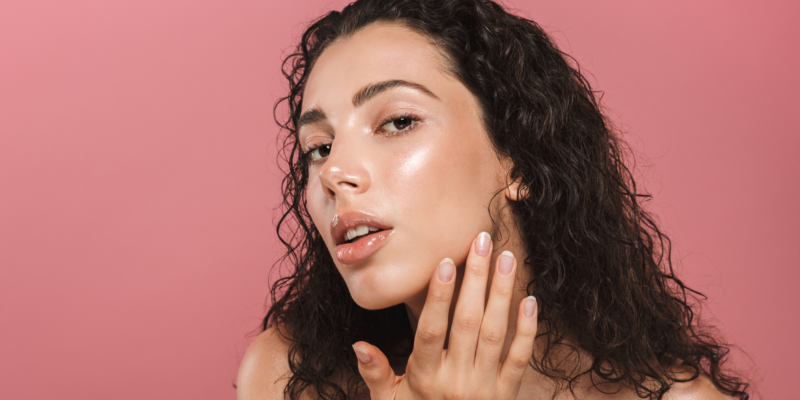For six long years, I battled hormonal acne. It wasn’t just the breakouts that took a toll—it was the endless cycle of hope and disappointment as I tried every product, treatment, and lifestyle change I could find. Nothing seemed to work for me. But after years of trial and error, I finally discovered a solution that cleared my skin for good.
This blog post isn’t just about the final result—it’s about the journey: the experiments, the lessons, and the final breakthrough. If you’re struggling with hormonal acne and feeling like nothing works, I want to share my story. My hope is that the steps I took can inspire you to find the solution that works for you too.
What is hormonal acne
Hormonal acne is a type of acne linked to fluctuations in hormone levels, particularly during certain phases of the menstrual cycle. Many women notice breakouts worsening during the luteal phase, when progesterone and estrogen levels shift, often leading to oily skin and increased sebum production. This excess sebum clogs hair follicles, trapping dead skin cells and creating the perfect environment for acne-causing bacteria to thrive. The result? Inflamed breakouts that often cluster around the jawline, chin, and lower cheeks, areas heavily influenced by hormonal activity.
While this condition is common in teenage years, adult women often face hormonal acne due to ongoing hormonal fluctuations caused by stress, diet, or conditions like polycystic ovary syndrome (PCOS). It’s also exacerbated by lifestyle factors like consuming high-glycemic-index foods (such as white bread and sugary snacks), dairy products, or experiencing disruptions in gut flora.
Things That I Didn’t Do to Clear My Skin
Once you’ve realized that you are suffering from hormonal acne, the first solution many women find is the birth control pill. I did my own research on this contraceptive, had a talk with a gynecologist, and was very determined to get it until I listened to a podcast episode from Feminine As F#ck that introduced me to a different view on the topic.
After a lot of consideration, I decided to stay away from the oral contraceptive as a “solution” to my hormonal acne. After all, the problem at the core of my acne would only be masked as long as I took the contraceptive, and come back full force once I got off of it. I’d rather find a way to heal my hormonal balance naturally, once and for all.
This is also the reason why I didn’t take any other medication for my acne (although I should mention that my skin was by far not nearly as bad as some of the horrific pictures of cystic acne you can find online). A dermatologist prescribed me some medication that I was supposed to take for the next +5 years, which would have been potentially liver and kidney damaging. Safe to say, I didn’t feel desperate enough to take those measures, yet.
Things That I Did to Improve My Skin
Skin Care
There are countless skincare products that allegedly help with acne-prone skin. Everything from washing gels, toners, serums, moisturizers, pimple patches, and more. I tried out all kinds of products throughout my six years of experimenting. This helped me learn a lot about having healthy skin in general, even though it did little to clear my acne.
What I learned through all this trial and error is this:
- Products specifically for acne-prone skin include far too often pore-clogging ingredients. Don’t just trust the name of the product. Instead, you need to do your own research. There are a couple of pore-clogging ingredient checkers online that I use to check any new skincare product before purchasing it. Additionally, I also like to check my products with one of the available code scanner apps for harmful ingredients that are not related to acne.
- Quality skincare doesn’t have to be expensive. Don’t think the +20 € a piece skincare from Sephora is needed to have a good skincare routine. In my experience, cheap brands are just as likely to have products with healthy ingredients. Not to mention, I have never noticed a difference between pricier or cheaper skincare products when applying them. So don’t break your wallet over these products. You should be especially careful to consider the recurring costs of committing to one skincare product. After all, you will have to buy it every couple of months and not just once. Those costs add up.
- Always wear sunscreen throughout the day! Even during the winter.
- Apply skincare in the correct order to get the best out of it.
- Do peeling, microneedling, and red light therapy once in a while.
Foods
While skincare deals with acne from the outside, the food that you eat can influence acne from the inside. Certain foods elevate or lower certain hormones or are inflammatory. One thing I have learned over six years of trying to influence my hormones through food is that you shouldn’t obsess over this.
Not only would it take multiple costly hormone tests at different parts of your cycle before and after every new food to find out what hormones are too high/low and which have improved or not. It is also incredibly frustrating to see the countless contrary information out there. I can’t tell you how many times I thought I found the perfect food to help me lower my androgens only to find another article that tells me it could also raise androgens.
As a result, I have learned to simply be mindful about what I eat. As long as I don’t eat too much of certain foods/ingredients, I should be fine.
These are the kinds of foods/ingredients I am careful about consuming too much of:
- Peanuts
- Dairy
- Soy
- Sugar
- Alcohol
- Caffeine
And these I try to eat more of:
- Nuts (especially walnuts)
- Seeds (especially chia seeds)
- Cruciferous vegetables
Supplements
Eating healthily is important whether or not you have acne. However, unless you obsess over your meal plan to a degree that most of us have no time or energy for, you will still find yourself at least slightly deficient in some of the important vitamins and minerals. That’s where supplements come in. I started to take more and more specific supplements targeted towards vitamins and minerals that were supposed to help with acne. Among them were Omega 3, Zinc, Magnesium, Vitamin A, and Vitamin B. In the last year though, I decided to replace most of these supplements with a Multivitamin & Multimineral supplement.
Whether or not these supplements make you healthier or are actually harmful is still a controversial point in science. Ultimately, everyone has to decide for themselves whether or not to take them. Personally, I haven’t experienced any symptoms that would support either opinion.
When talking about supplements, another often disregarded topic is that of your gut health. The health of your gut (e.g., leaky gut syndrome) can impact your overall health, including your skin. Probiotics can help with that, though again I haven’t noticed any improvements.
Blood Work
Having your doctor run a blood test can reveal underlying health issues that might be causing your acne. Beyond reassuring me that I was healthy, it didn’t help me much though.
Cycle Syncing
This is a concept I came across in the book In the Flo. The book talks about how our life is running on a 24-hour circadian rhythm. We structure our habits into the categories of morning, afternoon, and night. However, different from men, whose hormones also ebb and flow in a circadian rhythm, we women additionally have a menstrual cycle. That’s why certain tasks are easier for us at certain times of our cycle (menstruation, follicular phase, ovulation, luteal phase).
As such, cycle syncing means syncing your life with the phases of your cycle as much as possible. That means eating certain foods during certain phases, doing different workouts depending on the phase, as well as doing creative work or structured tasks at different times of the month.
I played around with this concept for a while, especially the food syncing. Today, the concept that I mostly still adhere to is that the menstrual phase is one of rest. Instead of cardio and weight training, I do yoga and stretching. I also allow myself to take it easier on studying without feeling guilty. Lastly, I use it as a time to reflect on my month and my goals.
Sleeping 7 Hours Every Night
While I haven’t found any information that sleep and acne have a correlation, I have learned that sleep has an even bigger impact on our current and future health than I thought. That’s why I wanted to include this as one of the things I did to heal my acne. To keep it short, I achieve at least 7 hours of sleep every night, with most nights being closer to 8 hours. And I am talking about actual sleep, not just time in bed.
Adjusting My Environment
Avoiding pore-clogging ingredients in shampoo and body wash: If you struggle with acne on your back and breast, then you should take a deeper look into the products you are using. For me, this meant avoiding products with coconut (even though I absolutely ADORE the smell), because coconut is highly pore-clogging.
Sleeping on a satin pillowcase: Satin is kinder to the skin and hair than cotton. And if you sleep on your side or stomach and toss and turn in bed, then you know just how much contact your skin has with your pillowcase for one-third of your life. That’s a huge chunk of time we can optimize for our skin.
Washing your pillowcase regularly: Imagine your pillowcase as a napkin. How many days would you want to use the same napkin? Probably not for multiple weeks on end. Your pillowcase might not get smeared with food residue, however, it does get oils, old skin, skin and hair care products, as well as sweat all over it. Do your skin a favor and keep its exposure to bacteria to a minimum by washing your bedding more often.
The Final Solution
Six years is a long time to experiment with all types of solutions for hormonal acne. Since it always takes 1-3 months to see actual results on your skin, my motivation to find a new solution came in 3-4 bursts every year, in between which I was disappointed that my skin was still breaking out twice a month.
Of course, it also didn’t help, that University comes with stressful periods that cause more breakout, regardless of what I did. And sometimes, I had wonderfully clear skin, without being able to replicate it during the next cycle.
All in all, it’s been a longer journey than I expected. I am grateful for it though, because I learned many different topics, I might have otherwise never spend much time on. It has also proven to be a trial for my confidence to leave the house with acne marks. Nowadays, I can always tell myself that I’ve looked worse and survived that just fine.
I am a bit sad to say, that my final acne solution hasn’t been as ‘natural” as I had hoped for, although it is still better than outright medication.
The solution is: Personalized skin care from dermatologists
It was by pure accident that I came across the website of Formel Skin. After reading through the founder’s story as well as many reviews that resonated with me, I decided to give it a try and place an order. I’m now two and a half months into the treatment and feel confident to say, that it has been a full success. The first couple of weeks I experienced a bit of the expected worsening of my acne, before my skin started to heal for good.
While Formel Skin is (at the moment) only shipping to Germany and Switzerland, there are similar businesses all over the world.
Frankly, I am unsure, if I would have accepted those extra costs while I was a student without a regular income. However, if you do have the money to spare, then I believe that it is an investment you won’t regret.



